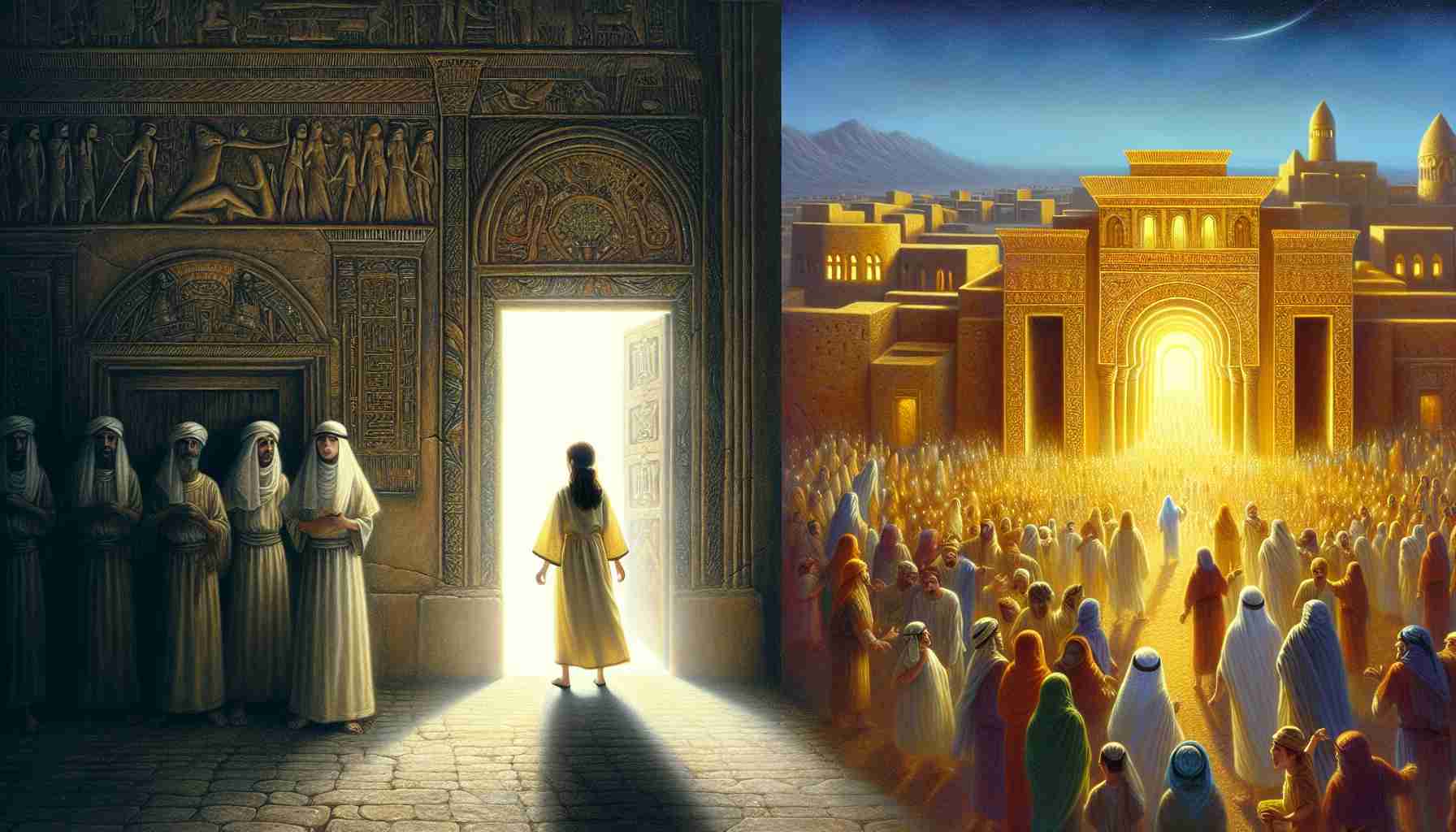

You wouldn’t know my name from the scrolls, but I served in Pharaoh’s palace. I was a scribe—one of many, my place marked by ink stains and silence. I lived most of my days in the light of power, recording Pharaoh’s words, watching his lips move as if every syllable shaped the world. Until the ninth plague came. Until darkness fell.
It started so suddenly.
One afternoon, the sun vanished—not behind a cloud, but behind a thick, choking blackness. It wasn’t night. It was a weight. A living thing. I held my hand inches from my face and saw nothing. No flicker. No shadows. Just pitch so deep it felt like the world had closed its eyes.
And I couldn’t move.
Hours passed, or maybe days. It was hard to tell. We couldn’t light torches—the flames wouldn’t take. People screamed in the dark, but even their voices seemed swallowed. The walls I knew like my own skin vanished. I sat on the floor of the scribe’s chamber, curled up, breath shallow. I felt the cold stone beneath me, but everything else—sight, time, meaning—was gone.
That was when I finally believed.
See, I had heard of Moses—the Israelite leader demanding freedom for his people. I had listened as he warned of each plague: water turning to blood, frogs, lice, wild animals, disease, boils, fire from the skies. We scribes penned the reports with careful detachment. We called them natural wonders, misfortunes. We convinced ourselves that our gods would overcome his.
But this? This was not natural. This could not be explained away.
For three days, no one saw another person. It was as if God had torn away all we trusted—our sight, our pride, our power. The great nation of Egypt, paralyzed by absence. The darkness was not just on our skin. It was inside us.
Then I remembered something I had read once, from the Israelite scrolls—they called their God the Creator of Light, the One who said, “Let there be light.” And now, He had taken it back.
But here is what haunts me most.
While Egypt lay frozen in darkness, the Israelites had light in their dwellings. That truth spread among us like wildfire once the sun returned. They walked by lanterns while we stumbled. They moved while we wept.
God showed us who held the light—and we rejected it.
Pharaoh’s rage burned when Moses came again. He would not let them go. Not even now.
But me? I couldn’t be the same.
When the light finally returned, I saw in colors I’d never noticed before. Everything looked different—no, I was different.
I still wore the robe of a scribe, still dipped my pen in ink. But I watched Moses more than Pharaoh now. I started asking questions.
And when the final plague came, and the Israelites walked free, I followed from afar.
Not as a scribe.
But as someone seeking the light that never left them.
You wouldn’t know my name from the scrolls, but I served in Pharaoh’s palace. I was a scribe—one of many, my place marked by ink stains and silence. I lived most of my days in the light of power, recording Pharaoh’s words, watching his lips move as if every syllable shaped the world. Until the ninth plague came. Until darkness fell.
It started so suddenly.
One afternoon, the sun vanished—not behind a cloud, but behind a thick, choking blackness. It wasn’t night. It was a weight. A living thing. I held my hand inches from my face and saw nothing. No flicker. No shadows. Just pitch so deep it felt like the world had closed its eyes.
And I couldn’t move.
Hours passed, or maybe days. It was hard to tell. We couldn’t light torches—the flames wouldn’t take. People screamed in the dark, but even their voices seemed swallowed. The walls I knew like my own skin vanished. I sat on the floor of the scribe’s chamber, curled up, breath shallow. I felt the cold stone beneath me, but everything else—sight, time, meaning—was gone.
That was when I finally believed.
See, I had heard of Moses—the Israelite leader demanding freedom for his people. I had listened as he warned of each plague: water turning to blood, frogs, lice, wild animals, disease, boils, fire from the skies. We scribes penned the reports with careful detachment. We called them natural wonders, misfortunes. We convinced ourselves that our gods would overcome his.
But this? This was not natural. This could not be explained away.
For three days, no one saw another person. It was as if God had torn away all we trusted—our sight, our pride, our power. The great nation of Egypt, paralyzed by absence. The darkness was not just on our skin. It was inside us.
Then I remembered something I had read once, from the Israelite scrolls—they called their God the Creator of Light, the One who said, “Let there be light.” And now, He had taken it back.
But here is what haunts me most.
While Egypt lay frozen in darkness, the Israelites had light in their dwellings. That truth spread among us like wildfire once the sun returned. They walked by lanterns while we stumbled. They moved while we wept.
God showed us who held the light—and we rejected it.
Pharaoh’s rage burned when Moses came again. He would not let them go. Not even now.
But me? I couldn’t be the same.
When the light finally returned, I saw in colors I’d never noticed before. Everything looked different—no, I was different.
I still wore the robe of a scribe, still dipped my pen in ink. But I watched Moses more than Pharaoh now. I started asking questions.
And when the final plague came, and the Israelites walked free, I followed from afar.
Not as a scribe.
But as someone seeking the light that never left them.